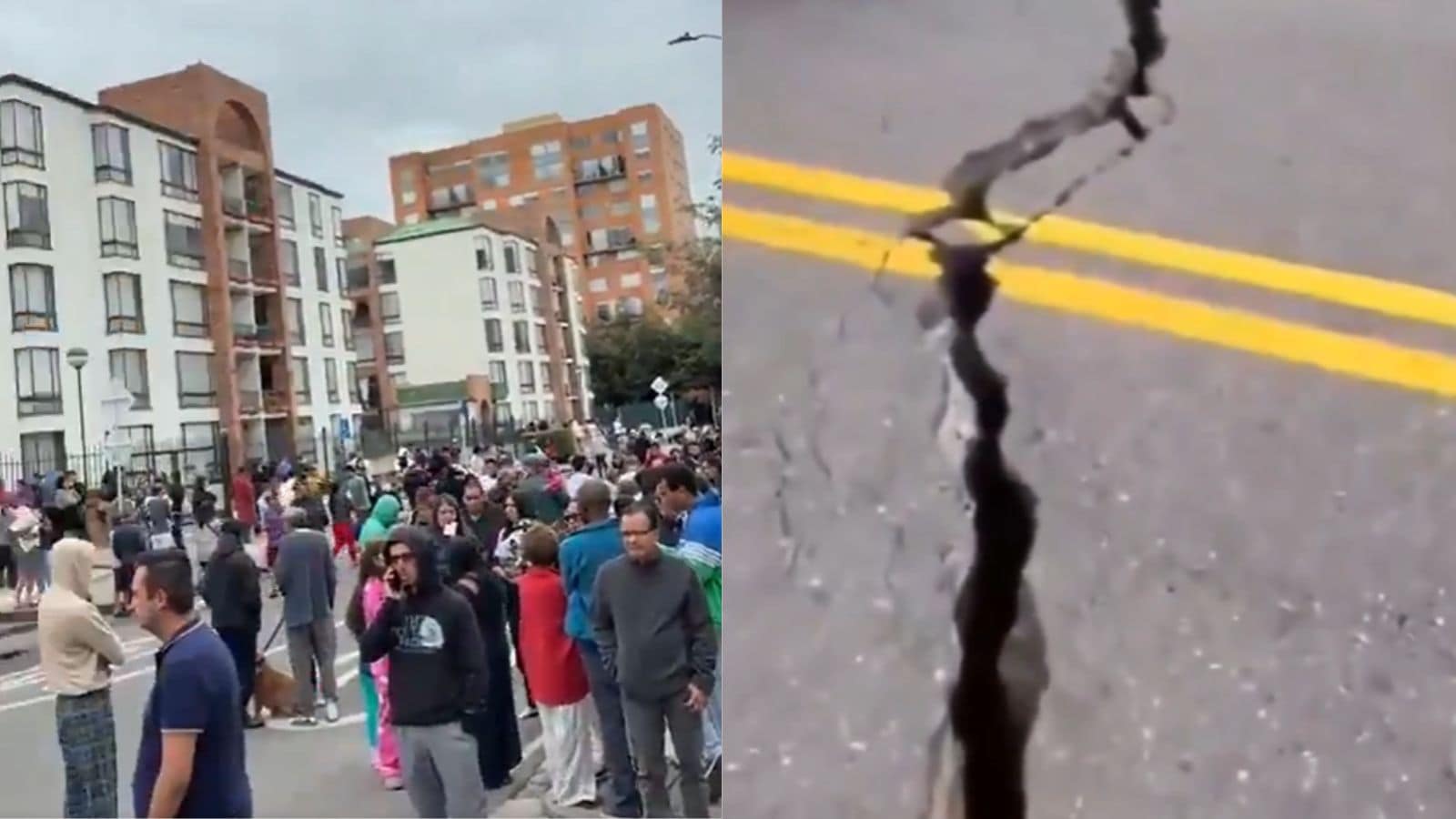Spain's Sánchez hopeful about restoring energy; urges residents to minimise travel, not speculate as to causes, use phones responsibly
Spanish prime minister Pedro Sánchez has just given a press conference offering an update on the situation in the country.
The prime minister acknowledged the “tremendous” impact on the lives of residents but sought to reassure them that the government was working on resolving the problem as soon as possible. In three regions of Andalusia, Extremadura, and Madrid the government will use extra emergency powers under civil protection laws.
Sanchez said that the process of restoring energy was under way across the country, thanks to interconnectors with France and Morocco and domestic energy sources, which should allow the energy supply to be restored “soon.”
He said that “a strong technical fluctuation in the European electricity system” led to the blackout but that there was no “conclusive information” on what specifically caused it.
He pointedly warned against speculating about the cause of the outage. “We are not ruling out any hypothesis, but we must focus on what is most important, which is restoring electricity to our homes,” he said.
Sanchez said that the hospital system was functioning despite the difficulties thanks to power generators, and while ATMs are affected, the underlying banking systems are operating normally. He also talked about train and air travel, in line with previous updates we brought you in this blog.
Sanchez also asked residents to minimise travel, not spread unverified information, and use mobile phones “responsibly” by keeping calls short and using the emergency 112 line only when necessary.
Another meeting of the national security council has been called for 7pm local time, he said.
Key events 8m ago Spain, Portugal power outage 'spectacular' wake up call for countries 51m ago Major power outage causes chaos in Spain and Portugal – video 1h ago Spain's Sánchez hopeful about restoring energy; urges residents to minimise travel, not speculate as to causes, use phones responsibly 2h ago Travel disruptions after energy outrage in Spain, Portugal - in pictures 2h ago Travel plans chaos as Spanish intercity trains won't be restored today 2h ago Spain energy consumption gradually going back up - reports 3h ago Portuguese PM hopes to see energy restored in coming hours 3h ago ‘No cause’ of outage identified yet, but 'no evidence' of cyberattack, EU’s Costa says 3h ago 'No indications of any cyber-attack,' EU's Costa says as he confirms contact with Spanish, Portuguese leaders 3h ago Disruptions in Spain, Portugal - in pictures 3h ago 'Impossible' to say when electricity will be restored in Portugal, operator says 4h ago European Commission's von der Leyen offers EU's support to Spain in call with Sánchez 4h ago No evidence outage was caused by deliberate act, senior EU commissioner says 5h ago 'Six to ten hours' to restore energy in Spain,' official says 5h ago European Commission in contact with Spain, Portugal over power outages 5h ago Your experiences of blackout in Spain, Portugal 5h ago Blackout in Spain, Portugal - in pictures 5h ago Spanish blackout in charts - visual 5h ago Affected by Spain, Portugal blackouts? Email the blog 5h ago Spanish government investigates origins, 'all resources' focused on solving blackout 6h ago Spanish, Portugese governments to convene emergency cabinet meetings - media 6h ago Blackout in Spain, Portugal - in pictures 6h ago Air traffic in Spain, Portugal affected by outages - Flightradar 6h ago Russia declares surprise three-day ceasefire in Ukraine around Victory Day anniversary 6h ago Madrid residents hit by energy disruptions 6h ago Major disruptions across cities, transport systems in Spain, Portugal - reports 7h ago Vatican confirms Conclave to begin on 7 May 7h ago Spain, Portugal report major electricity disruptions 7h ago Greenland ready for strong partnership with US, but 'never piece of property that can be bought,' prime minister says 7h ago Conclave to elect new pope to begin on 7 May - Reuters 7h ago Sistine Chapel to be closed from today 'for requirements of Conclave' 7h ago No date for Trump-von der Leyen meeting, EU spokesperson says 7h ago EU welcomes Trump's comments acknowledging Russia's attacks, says North Korean backing shows Russia's desperation 8h ago 25 arrested after spate of attacks on French prisons 9h ago Bardella ready to stand in for Le Pen in 2027 race 9h ago Vatican expected to set timeline for pope election 10h ago Russia 'ready' for talks, but demands recognition of occupied territories 10h ago Pro-Ukraine politician picked to lead German diplomacy in Merz's government 10h ago Morning opening: What's next for Ukraine? Show key events only Please turn on JavaScript to use this feature
Rush hour travel disruptions in Spain, Portugal after power outage – in pictures




Spain, Portugal power outage 'spectacular' wake up call for countries

Jasper Jolly
The risks posed to electrical systems by big variations in temperatures are well known in the industry, but it is rare for it to cause problems on the scale of the power outage in Spain and Portugal on Monday.
Transmitting power through wires comes with technical challenges. The air around conductors ionises, causing visible and audible electrical discharges known as corona discharges. That energy is lost. Extreme temperature variations cited by Portugal’s Redes Energéticas Nacionais can cause bigger problems by affecting metal wires at a molecular level, changing the frequency of the electrical current.
“Due to the variation of the temperature, the parameters of the conductor change slightly,” said Taco Engelaar, managing director at Neara, a software provider to energy utilities. “It creates an imbalance in the frequency.”
Once frequency drops below a certain level, power generators will automatically turn off in order to avoid overloading the grid.
Engelaar said that – if the atmospheric cause is confirmed – it would be a “pretty spectacular” wake-up call for other countries that they need to invest in resilience against climate risks.
“To see it at a national level, across two countries, I’ve never seen it in my career,” he said.

Helena Horton
Portuguese energy company REN reportedly told the BBC that outages were caused by “induced atmospheric vibrations” caused by variations in air temperature in Spain.
These essentially cause power lines to oscillate – wave around – which can disrupt power supply and cause blackouts.
Prof Chenghong Gu, Department of Electronic & Electrical Engineering, University of Bath, explained: “High temperature, high humidity, rough conductor surfaces, can cause corona effects on transmission conductors. The current in these conductors produce electric fields, and they can interact with the electric charges in the ambient atmosphere.
“Under certain conditions, this can cause the vibrations of conductors. Then, the vibrations can cause the changes of the physical characteristics of conductors, reflecting in their key parameters, such as their impedance, reactance.
The stability of power systems is very sensitive to these parameters, and if they keep changing, currents in transmission lines, voltages in different locations, and system frequency would change. In the worst case, system frequency could drop too low, and customers must be cut off to re-balance the supply and demand.”
Dr Grazia Todeschini, Reader in Engineering at King’s College London, cautioned that a definite cause has not yet been verified.
She said these situations usually only happen under exceptional circumstances. The weather in Spain has not been exceptional recently, though climate breakdown certainly could cause the conditions which could make blackouts more likely as electricity cables struggle in extreme weather, from heatwaves to storms.
Dr Todeschini explained: “Frequency recordings in various parts of continental Europe shows fluctuations before the disconnection took place, but at this stage attributing a source is still premature. It is worth noting that electricity system operators carry out studies to ensure system stability under contingency conditions. Therefore, these types of events are typically the results of exceptional circumstances.”
European Commission president Ursula von der Leyen said she spoke with the Portuguese prime minister, Luís Montenegro, this afternoon.
“We will work together to help restore the electricity system and reassure citizens. Because energy security is crucial for the EU,” she said.
She earlier posted about her separate conversation with the Spanish prime minister, Pedro Sánchez (15:59).

Jakub Krupa
Thanks for all your messages on how the power cut affected you and your loved ones in Spain and Portugal.
We can’t always bring all voices in on the blog, but it helps us build a fuller picture of what’s going on and inform our reporting. Thank you!
In a series of social media updates, the Portuguese government has issued similar recommendations for residents affected by the power loss, asking them to avoid unnecessary travels and not spread false information or speculative posts about the causes of the blackout.
One of the graphics reiterated that the Cybersecurity Centre had no indication that the power cut was caused by a cyber-attack.
Major power outage causes chaos in Spain and Portugal – video
Portuguese media are also reporting gradual resumption of energy supplies across the country starting with priority recipients such hospitals, airports and other parts of critical infrastructure.
The electricity grid operator will host a press conference at 8pm local time, Público reports.
Around 30,000 passengers are being evacuated by the Spanish rail operator Renfe from trains stranded as a result of today’s blackout, the Spanish news agency EFE reported.
A source told the agency that 116 trains were en route at the time of the outage.
Jason was among passengers affected as he emailed earlier to say he was stuck “about 30-40 miles southwest of Madrid, near Toledo.” Many of you also reported issues getting to and from various airports in the country.
Spain's Sánchez hopeful about restoring energy; urges residents to minimise travel, not speculate as to causes, use phones responsibly
Spanish prime minister Pedro Sánchez has just given a press conference offering an update on the situation in the country.
The prime minister acknowledged the “tremendous” impact on the lives of residents but sought to reassure them that the government was working on resolving the problem as soon as possible. In three regions of Andalusia, Extremadura, and Madrid the government will use extra emergency powers under civil protection laws.
Sanchez said that the process of restoring energy was under way across the country, thanks to interconnectors with France and Morocco and domestic energy sources, which should allow the energy supply to be restored “soon.”
He said that “a strong technical fluctuation in the European electricity system” led to the blackout but that there was no “conclusive information” on what specifically caused it.
He pointedly warned against speculating about the cause of the outage. “We are not ruling out any hypothesis, but we must focus on what is most important, which is restoring electricity to our homes,” he said.
Sanchez said that the hospital system was functioning despite the difficulties thanks to power generators, and while ATMs are affected, the underlying banking systems are operating normally. He also talked about train and air travel, in line with previous updates we brought you in this blog.
Sanchez also asked residents to minimise travel, not spread unverified information, and use mobile phones “responsibly” by keeping calls short and using the emergency 112 line only when necessary.
Another meeting of the national security council has been called for 7pm local time, he said.

Jem Bartholomew
When Doug Craib, a 60-year-old based in Brighton, boarded the 9.57am Madrid to Barcelona train to visit a friend on Monday morning, he was excited to travel on an affordable high speed rail network, with the under three-hour journey costing him £25.47.
But before he got to Barcelona, the train shuddered to a halt on the tracks. It was caught up in the mass outages that have plagued Spain, Portugal and parts of southern France on Monday.

For a while there was no mobile signal, and the doors remained sealed for about two hours until authorities arrived, open the doors and gave out drinks.
About six hours into being stuck on the train, one woman, who appeared to be in her twenties, had a panic attack amid the high temperatures, he said. “The air in the carriages is thick and hot,” Craib told the Guardian.
As we reported, Spain’s intercity trains will not be restored on Monday.
“The fire brigade are here now and they are getting people into the fresh air and police have brought more water,” he said. “I can’t see that evacuation would be simple so I’m guessing we will stay.”
Craib has given up hope of reaching his friend in Barcelona anytime soon.

Travel disruptions after energy outrage in Spain, Portugal - in pictures




Travel plans chaos as Spanish intercity trains won't be restored today
Spanish transport minister Óscar Puente said intercity trains will not be restored today as the country continues to work on bringing back electricity supply after a major disruption earlier today.
“We are working to ensure that, once the power supply is restored, we can resume these services, which will no longer be possible today,” he warned.
He added that it would take time to “restore the control systems” including safety mechanisms.
“The goal is to be able to provide service tomorrow if we recover power today, so tonight we will prioritise repositioning trains and resetting systems over the maintenance work being carried out at night,” he explained.
He added that Spanish airports were largely operating as normal using backup supply and generators, with 20% reduction in service for safety reasons.


 1 month ago
1 month ago


















